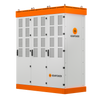Why expensive power could soon accelerate, rather than retard, the US EV adoption divide
Thus far US BEV adoption has largely been strongest in areas that have higher residential power prices. What if that became a feature, not a bug?
Kempower going to market before industry alliance completes standardisation

Electric trucking is set for a long-awaited paradigm shift bringing unprecedented charging speed and power, after Finish electronics firm Kempower announced its megawatt charging system (MCS) will be introduced in 2024.
MCS is a dedicated charging system for higher power above 1MW, specifically for heavy-duty electric truck charging. In comparison, DC charging typically reaches up to 350kW, meaning that MCS allows an equivalently sized battery to charge some three times faster than the best existing DC options.
The Tesla Semi, for example, a large class eight truck, has a battery capacity of around 900kWh. This means that DC charging at 300kW would take three hours or more to charge the truck fully. A 900kW charger would charge this battery in one hour, and charging exceeding 1MW allows a large battery such as this to charge in under an hour.
The business case for MCS is that trucks could then charge to high levels during mandated driver break times, and not add any additional downtime for fleets. Kempower says its first MCS chargers will operate at power levels of 1.2MW.
Ramesh Sainju, research and development engineer at Kempower called the development “a game-changer for heavy-duty transportation electrification”.
“The technology the world has been waiting for to help launch sustainable transportation into the future is here today,” says Kempower chief market officer Jussi Vanhanen. “Vehicle charging will be the fastest drivers have ever experienced and with Kempower’s full-service solutions, truck fleet owners can count on reliable charging when and where they need them.”
The company will start delivering the first chargers in the first quarter of next year in Europe, according to Han Dix, head of sales at Kempower. However, going to market next year means that Kempower will begin selling its MCS chargers before the global industry has finalised the requirements for megawatt charging to become a charging standard. As such, Kempower could find itself at odds with an industry coalition working towards charging standardisation goals.
Industry effort
Kempower is a core member of the Charging Interface Initiative, or Charin, an international industry alliance comprised of over 320 stakeholders, which has been developing MCS and working towards standardising the system for all future manufacturers of megawatt chargers.
However, Charin’s efforts have been bogged down in a procedural quagmire with regulators. But the chairman of the alliance, Claas Bracklo, told EV inFocus in September that the future applications of MCS and its ability to contribute to the business case of electric freight trucking make it worth waiting for.
Just as Charin is aiming to utilise as much crossover technology from its CCS standard to reduce time to market, Kempower says that the new MCS solution is based on the company’s existing technology, including its high-power satellite with MCS liquid-cooled charging plug and two 600 kW Kempower Power Units.
Kempower will now go to market early with its MCS chargers before the finalisation of the charging standard. This echoes the move of EV market leader Tesla, which had been a member of Charin’s MCS taskforce but later decided to go to market with its North American Charging Standard product, citing frustrations with delays in the standardisation procedures.
Charin is no stranger to such departures either, as US battery cell company NXU left the organisation in June due to its plans to develop an AC use case for fast charging. However, Charin does not envisage any problems for an early-to-market MCS connector, and stresses that a market launch before standardisation is the product of joint effort across the industry.
“Charin is happy to see its efforts concerning global charging standards becoming reality. Trust in the strength of a strong community is all. [There is] no need for proprietary solutions,” Bracklo tells EV inFocus.
And Kempower is keen to stress it remains committed to the coalition. “Charin has done great work in developing the MCS standardisation and we see that it is highly valuable to have a common industry standards for MCS," says Vanhanen. "The Kempower MCS solution will naturally be compliant with Charin specifications.”
Use case
“Electric trucks are typically charged with a DC fast charger either overnight, at a warehouse destination, or on-the-move along highways. Larger EVs need larger power sources. Our megawatt charging solution serves all those use cases: overnight, destination and on-the-move charging,” Kempower’s Vanhanen says.
The primary use case for MCS, as envisioned by Charin, is high-traffic highway charging stations at which trucks can charge while drivers take mandated breaks. Charin is aiming for MCS highway charging to be situated in existing truck stops and service stations, although in many cases it will “need a bit more space because the truck is standing longer at the ‘pump’ [charger] compared to today, and that requires a bit more land space and that seems to be really a critical point today”, according to Bracklo.
Insider Focus LTD (Company #14789403)